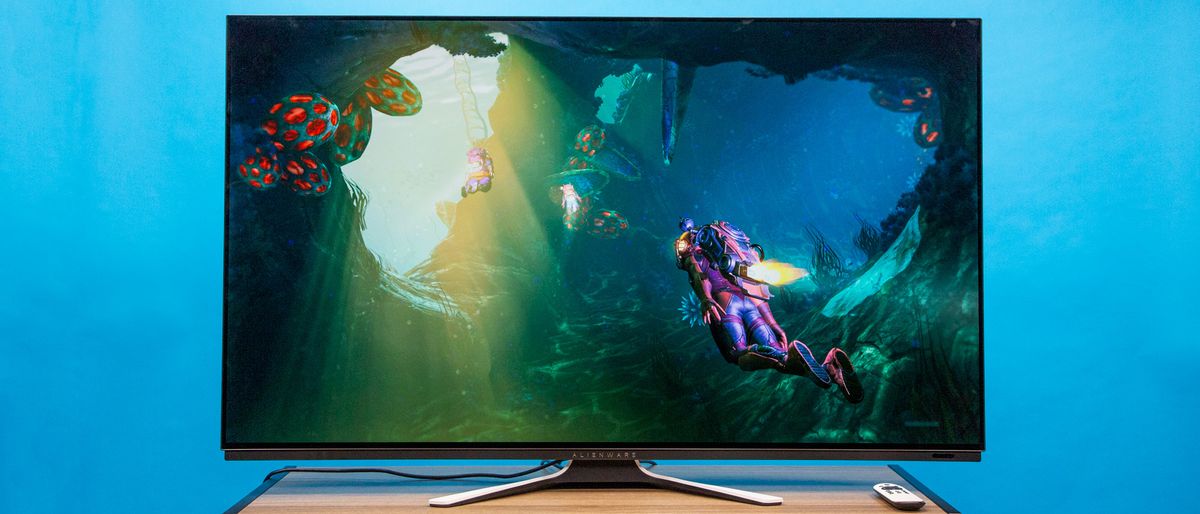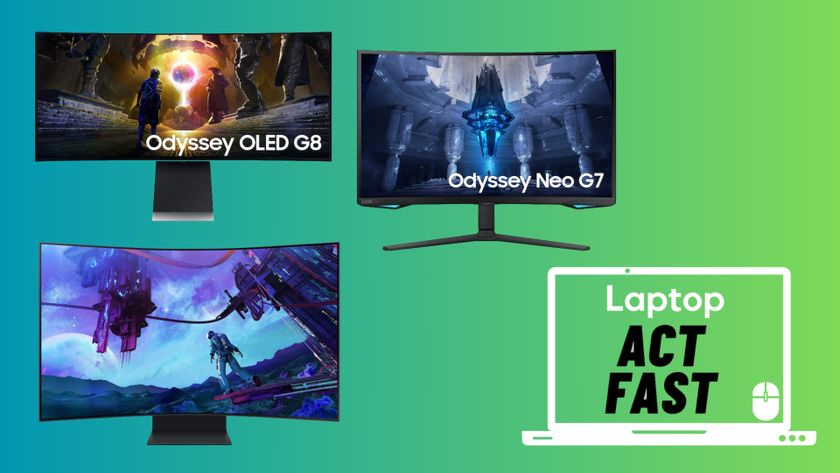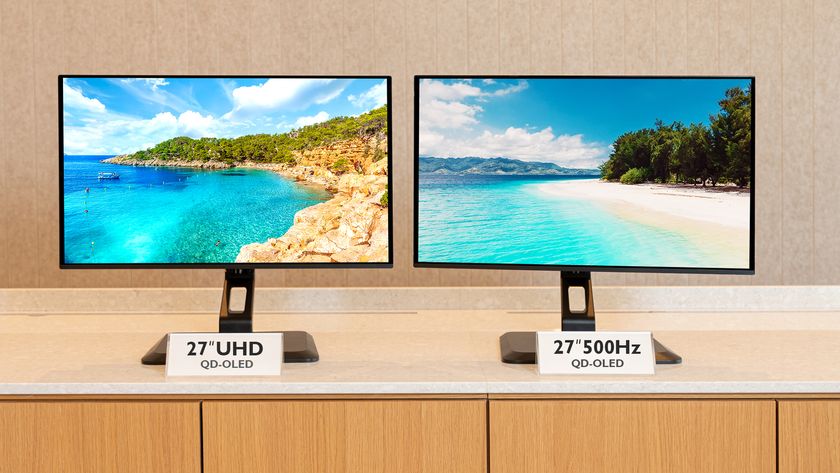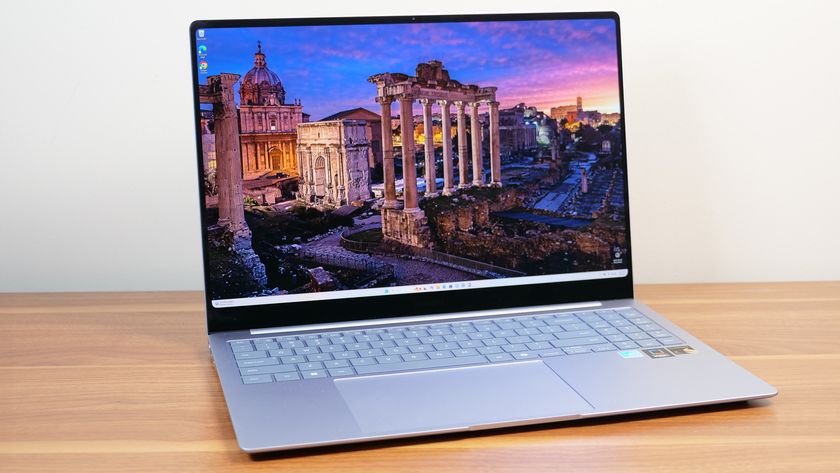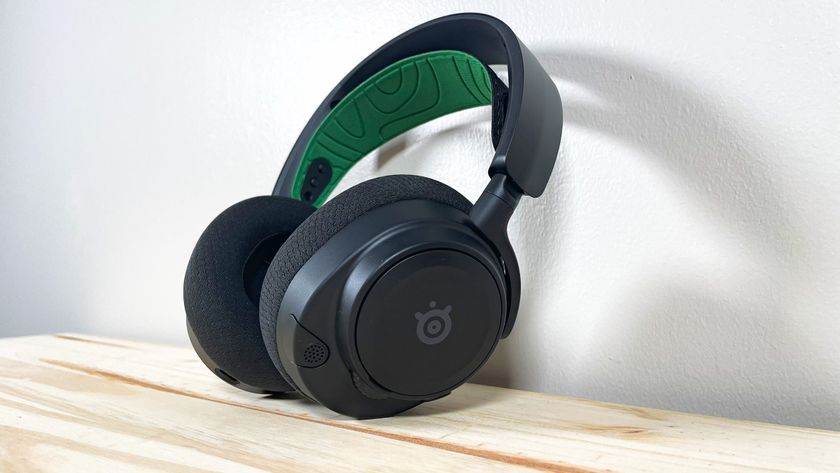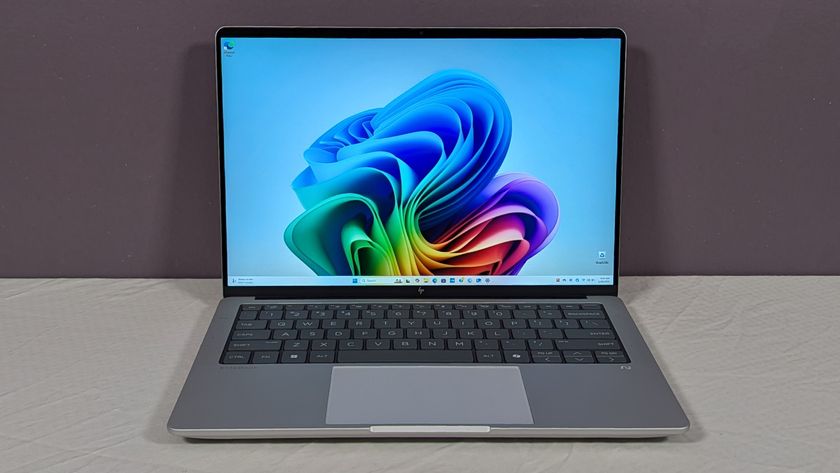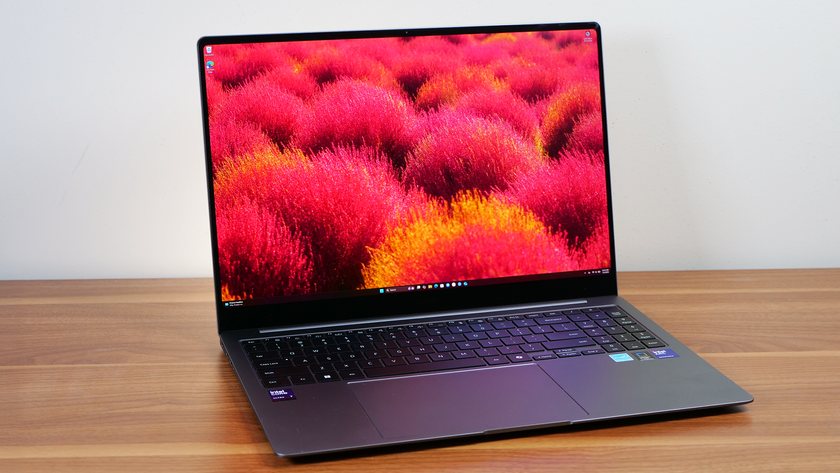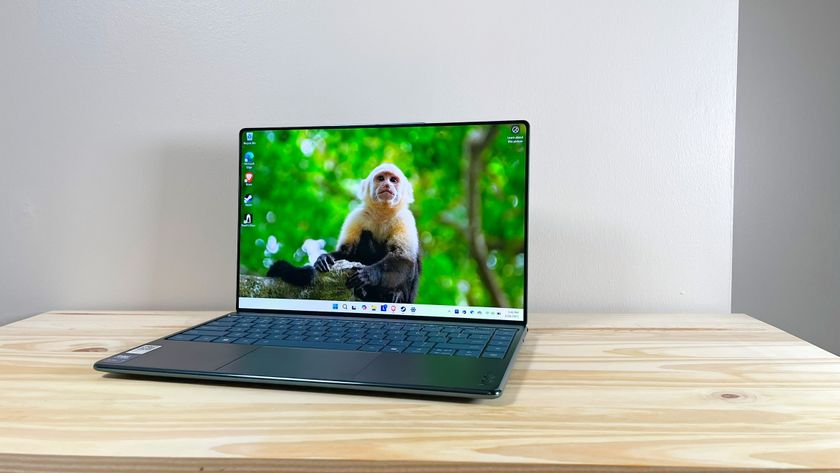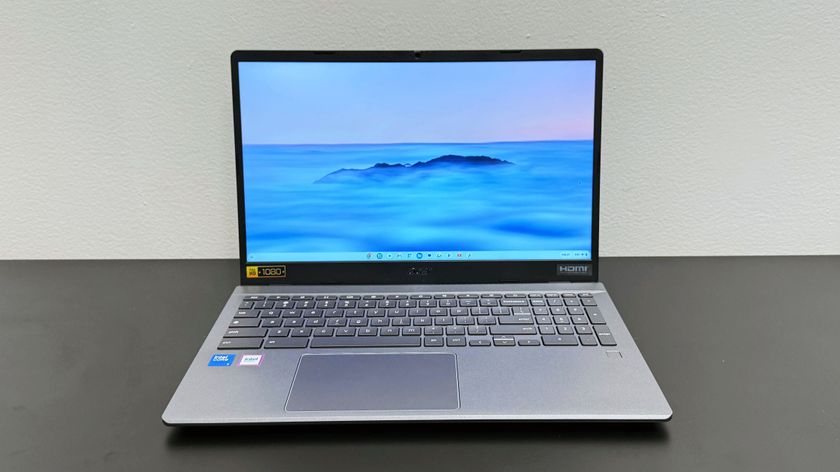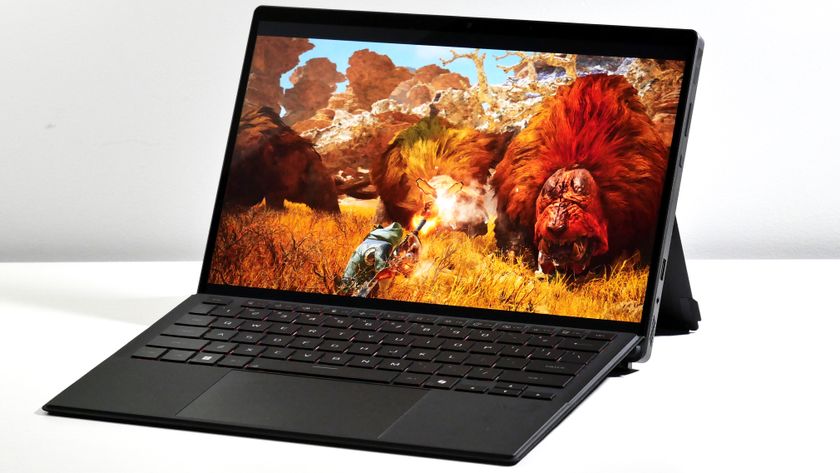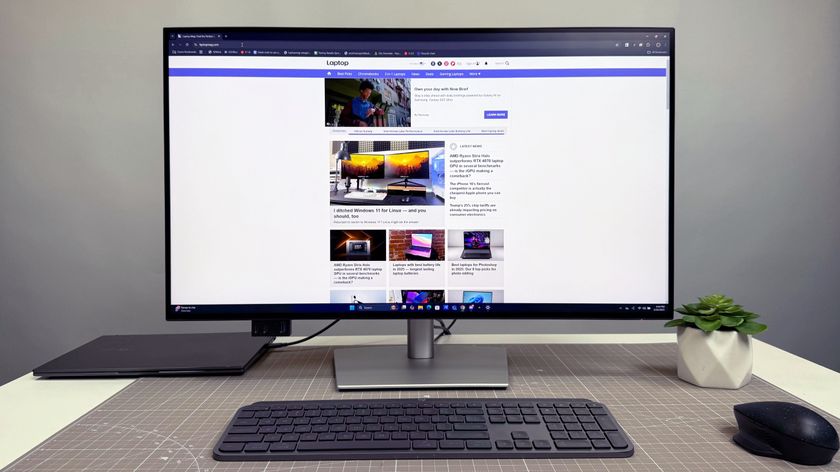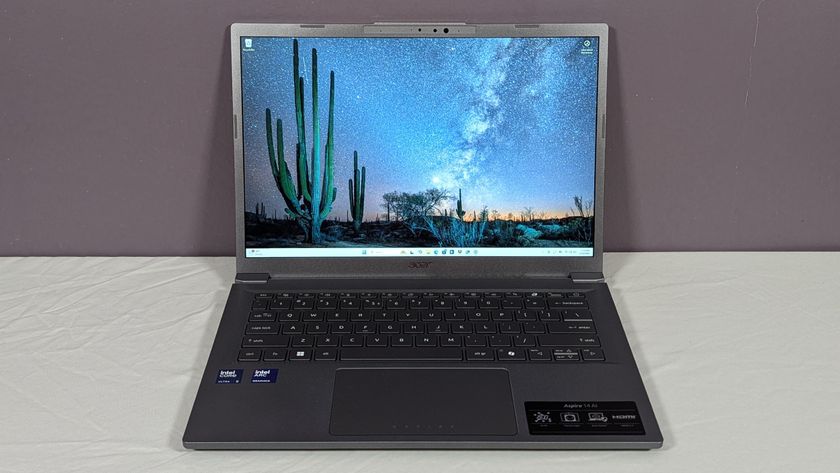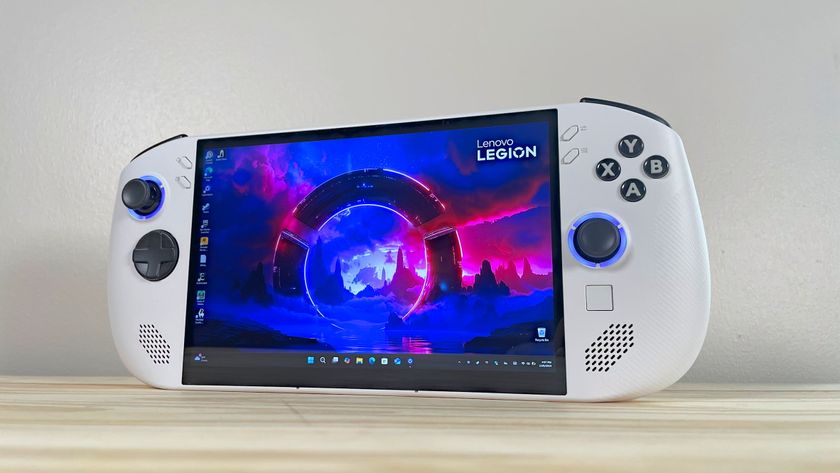Laptop Mag Verdict
Alienware's AW5520QF 55-inch OLED is one of the best gaming monitors you can buy, but one of the most expensive.
Pros
- +
Gorgeous 4K OLED panel
- +
Elegant, practical design
- +
AMD FreeSync and 120Hz refresh rate
- +
Useful port selection
Cons
- -
Extremely expensive
- -
Low brightness
Why you can trust Laptop Mag
When Alienware released the Area-51m, it proved that a laptop could be a proper desktop replacement. Now, the gaming brand is blurring the lines between monitors and TVs with the AW5520QF, a massive, 55-inch OLED gaming monitor with a price to match its size. Overlooking that price for a second, the AW5520QF has a lot to offer, including a stunning 4K OLED panel, a sleek yet practical design and plenty of useful and easily accessible ports.
But as you might have guessed, the AW5520QF costs a pretty penny; $4,999 to be exact. That's significantly more than the cost of many 4K OLED TVs, like the excellent LG C9 OLED. But it's important to consider that those don't pack the same feature set as the AW5520QF, which includes AMD FreeSync, a 120Hz refresh rate and a 1-millisecond response time. While those perks help differentiate the AW5520QF 55-inch OLED display, they don't make it a good option for anyone but the most dedicated gamers who don't have a budget. But, the AW5520QF is still one of the best gaming monitors around.
Design
With a 55-inch panel, the Alienware AW5520QF looks like a modern TV from afar. But look closely and you'll notice a few design elements that would be of place on a TV.
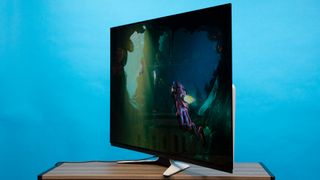
Alienware's Legendary design language, which influences the look of its desktop and laptops, is in full effect on the AE5520QF. But don't worry about that sci-fi-inspired aesthetic looking garish -- there is an elegance to the monitor that makes it blend right into a posh apartment filled with midcentury furniture.
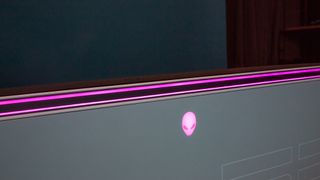
In fact, I wouldn't have second-guessed you if you told me that the Alienware AW5520QF was crafted by a team that designs supercars. The monitor's sophisticated design starts with smooth curves around the AW55020QF's boomerang-shaped legs. Those same subtle lines continue on to the stark white panel in the back, which has the number 55 painted in a stylish font.
But you might not notice, because next to those design elements are an illuminated Alienware logo and an ovular RGB light strip, which casts colorful hues against the wall. Like the lighting on Alienware's laptop keyboards, the AW55020QF's glorious RGB flair can be customized to your liking. My personal favorite makes the light pulse different colors.
If you don't have space on your desk (or entertainment center) to put this massive monitor, you can mount it to your wall using the 400 x 400-millimeter VESA mount that attaches to the back of the monitor once you remove its legs and back panel. Doing so is very easy because the panel snaps to the back of the monitor with magnets.
Unsurprisingly, the AE5520QF is larger and heavier than other monitors. At 30.3 x 48.3 x 10.4 inches and 59 pounds (panel only), the AE5520QF is much bigger than the 38-inch LG 38GL950G (35.3 x 22.2 x 10.2 inches) and the Dell P3418HW (32 x 21 x 8.9, 22 pounds).
Ports and interface
The AE5520QF splits it ports between the back panel and the left edge. Alienware smartly chose to move ports that you regularly need to access — two USB downstream inputs (one with power charging), an HDMI and a headphone jack — on the left edge, so you can easily get to them.
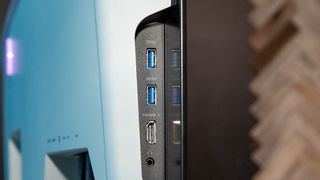
Other ports that you can plug in and leave alone are on the back panel. Those include the power connector on one side, along with two HDMI inputs, a DisplayPort, an SPDIF Out port (a digital audio connection for connecting to surround sound speakers), a USB upstream port and two USB downstream connections.
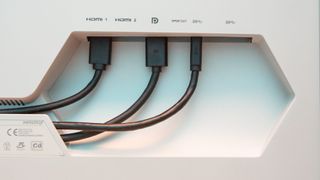
Cables are neatly organized into two slots that run along the back of the monitor. They're further concealed by the magnetic back panel that snaps into place.

You can control the settings on the AE5520QF using the included remote control. Yes, we still promise this isn't a TV. The smooth, scalloped remote has the sleek look of the Apple remote but a similar shape to the ones you get with a Roku. There are discrete volume buttons on the remote as well as buttons for increasing and decreasing the display brightness. There is a four-way directional pad with a center "enter" button above which you'll find buttons for changing the sources, switching preset display modes and turning the monitor on and off.
Gaming performance
The AE5520QF has a 55-inch, OLED display with a resolution of 3840 x 2160 (16:9 aspect ratio), a refresh rate of 120Hz and AMD FreeSync to prevent screen tearing during fast-paced action.
All those features enable a fluid, free-flowing fast-paced action whether you're button mashing your way through a hack-and-slash or sprinting across a battlefield in a first-person shooter. Sure enough, the screen did an excellent job keeping up as we slashed at a nasty golem in The Witcher 3: Wild Hunt. Our character's movements were smooth, fluid and free of any screen tearing.
I was also really impressed by the picture quality of the AW5520QF. OLED remains the leading screen technology, offering perfect darks, super-high contrast levels and vivid colors. As advertised, the AW5520QF nails each of those features. And with a 4K resolution, the monitor's overall image quality is simply stunning.
MORE: Best Gaming Monitors: Top Picks for 1080p and 4K Gaming
As I watched Laptop Mag's assistant managing editor, Sherri L. Smith, play Shadow of the Tomb Raider, my eyes were greeted by lively blue sparks zapping out of nearby generators, providing the only semblance of light in an otherwise pitch-dark cave. Similarly, in The Witcher 3: While Hunt, the radiated golem cast a spooky green glow against the walls of the haunted cavern.
The enormous screen made everything look cinematic, while the panel's high resolution kept everything sharp. I could see individual strands of hair separate as Lara Croft floated in the water-filled hollow.
The only area in which the AW5520QF's falls short is brightness. The monitor is capable of reaching 400 nits but rarely does, even when the brightness is turned up to max. Yes, we've clocked areas of the screen that get close to that mark, but a higher brightness across the entire display would have helped these rich colors pop more than they did.
Video performance
Given how much you'll plunk down for one of these, we wouldn't be surprised if the AW5520QF doubles as your TV. To test how the AW5520QF performed as a TV, I streamed the stunning eight-part series Our Planet in 4K on Netflix.
Black levels were so deep on the AW5520QF that the opening sequence of Our Planet gave me a view of space that I had never seen before. And the display's dense pixel count was so sharp that individual stars were visible in a cluster of countless shining orbs.
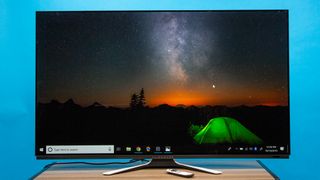
The details in the monitor never stopped blowing me away. Individual snowflakes were crystal clear when the mini-series took me on a tour of the Arctic, and I could even see small bubbles float in an underwater scene as penguins dived beak-first into the ocean. Perhaps my favorite scene was an aerial view of a forest, which had such incredible depth that I felt as though I were in the helicopter looking down.
Colors looked great — but they had more natural tones than the supersaturated look you expect from OLED. For example, the flamingos were an even, medium pink colors, not the vivacious neon I was expecting. As much as I appreciate those natural hues, I still wish the screen was brighter — it just lacks that eye-popping glow that you see from the OLED TVs at your local electronics store.
Audio
I was thoroughly impressed by the speakers (tuned by WaveMaxxAudio) underneath the AW5520QF, even if they didn't get as loud as I hoped. When we played Borderlands 3, the narrator's husky voice had a deep, gruff tone that most TV and monitor speakers wouldn't have captured. Explosions erupted at me with a deep rumble; gunshots burst with a clear, sharp ring; and I could hear the twang of Lara Croft's bow when playing Shadow of the Tomb Raider.
Gamers will also appreciate the speaker's ability to separate sounds and place them around you. This is especially helpful when you're playing a game like Fortnite and need to listen to footsteps for enemies sneaking behind you.
David Attenborough's voice deep voice was a bit recessed when I watched Our Planet, but I didn't have to turn up the volume too much to understand his narration.
Lab testing
THE AW5520QF didn't light up our benchmark tests but the numbers don't say everything. Our Klein-K10 colorimeter clocked an average of only 113 nits, although the monitor is able to reach 400 nits.
We often see discrepancies among the ratings manufacturers give their products and what our own equipment measures in a lab environment. Regardless, the AW5520QF disappoints when compared with the category average (264 nits).
Another area where the AW5520QF fell behind the competition is lag time. Our Leo Bodnar input lag tester (done over Wi-Fi), clocked a lag time of 29.5 milliseconds on the AW5520QF. That's close to what you get from most OLED TVs but not as quick as others, like the Samsung Q60 QLED.
The AE5520QF did much better on our color-reproduction test, covering 141.9% of the sRGB color gamut. With that score, the Alienware proves that it's much more vivid than the average gaming laptop (108%)
We also test the DCI-P3 color space as it's becoming the standard for movies and shows. The AW5520QF covers 100.5% of the spectrum, which is an outstanding result.
The colors on the 55-inch monitor aren't just saturated — they're also true-to-life. With a Delta-E rating of 0.27 (closer to 0 is best), the AE5520QF has more accurate colors than the average gaming laptop (0.3).
Modes and features
There are plenty of settings you can scan through if you want to tweak the performance and image quality of the AW5520QF.
Preset modes include a standard image, along with modes designed for first-person shooters, multiplayer online battle arena games, RTSs, RPGs and sports. There are also three additional gaming presets, a comfort view and settings that change the tones to warm and cool.
More granular controls let you adjust gain, hue, brightness, sharpness, contrast, aspect ratio and saturation.
The AW5520QF comes with a smart HDR feature that you can manually adjust to be optimized for desktop mode or when watching movies or playing games.
Bottom line
Is Alienware's AW5520QF gaming monitor overkill? Absolutely. For most folks, a 55-inch 4K OLED TV that costs a fraction of the price will do just fine for gaming. The giant monitor also isn't for competitive gamers, who are better off buying a smaller display with a lower resolution and faster refresh rate.
So, who should buy the AW5520QF? That small fraction of people who spend more time playing video games than watching movies or TV shows — and who don't have a budget. It's not that multimedia content won't look great on the AW5520QF, but you'd be better off buying a TV, which will give you a brighter, more vivid image at a lower price.
Ultimately, the AW5520QF is an ambitious monitor that makes sense only for a small slice of gamers — but those who can afford it will be treated with a gorgeous picture and excellent gaming performance.
Phillip Tracy is the assistant managing editor at Laptop Mag where he reviews laptops, phones and other gadgets while covering the latest industry news. After graduating with a journalism degree from the University of Texas at Austin, Phillip became a tech reporter at the Daily Dot. There, he wrote reviews for a range of gadgets and covered everything from social media trends to cybersecurity. Prior to that, he wrote for RCR Wireless News covering 5G and IoT. When he's not tinkering with devices, you can find Phillip playing video games, reading, traveling or watching soccer.
